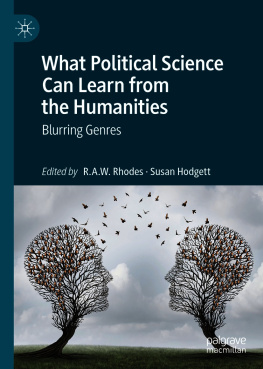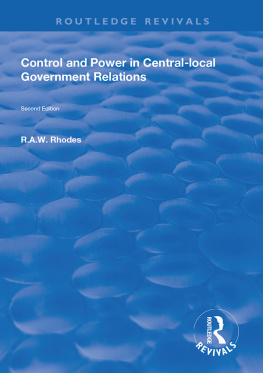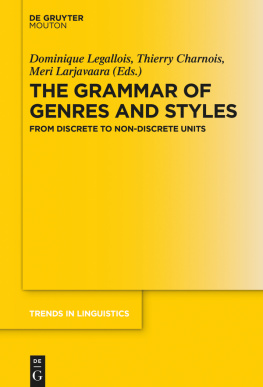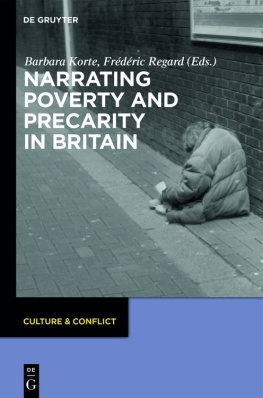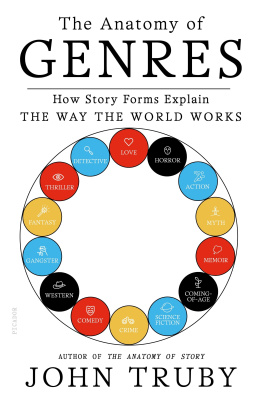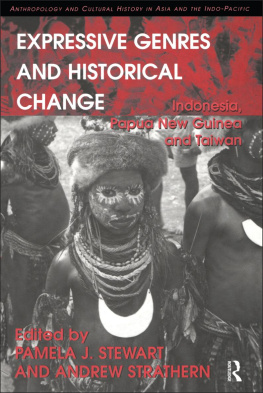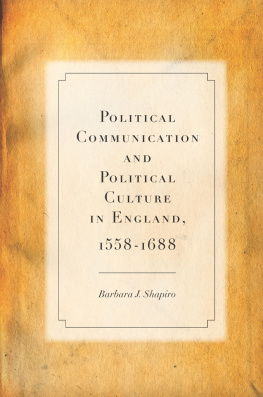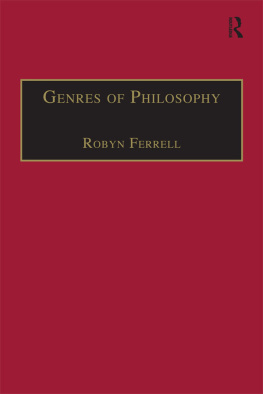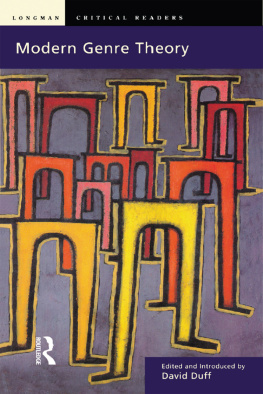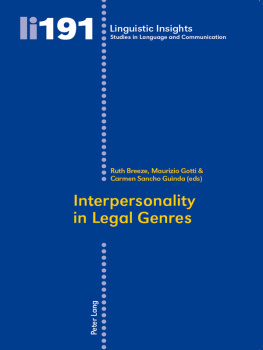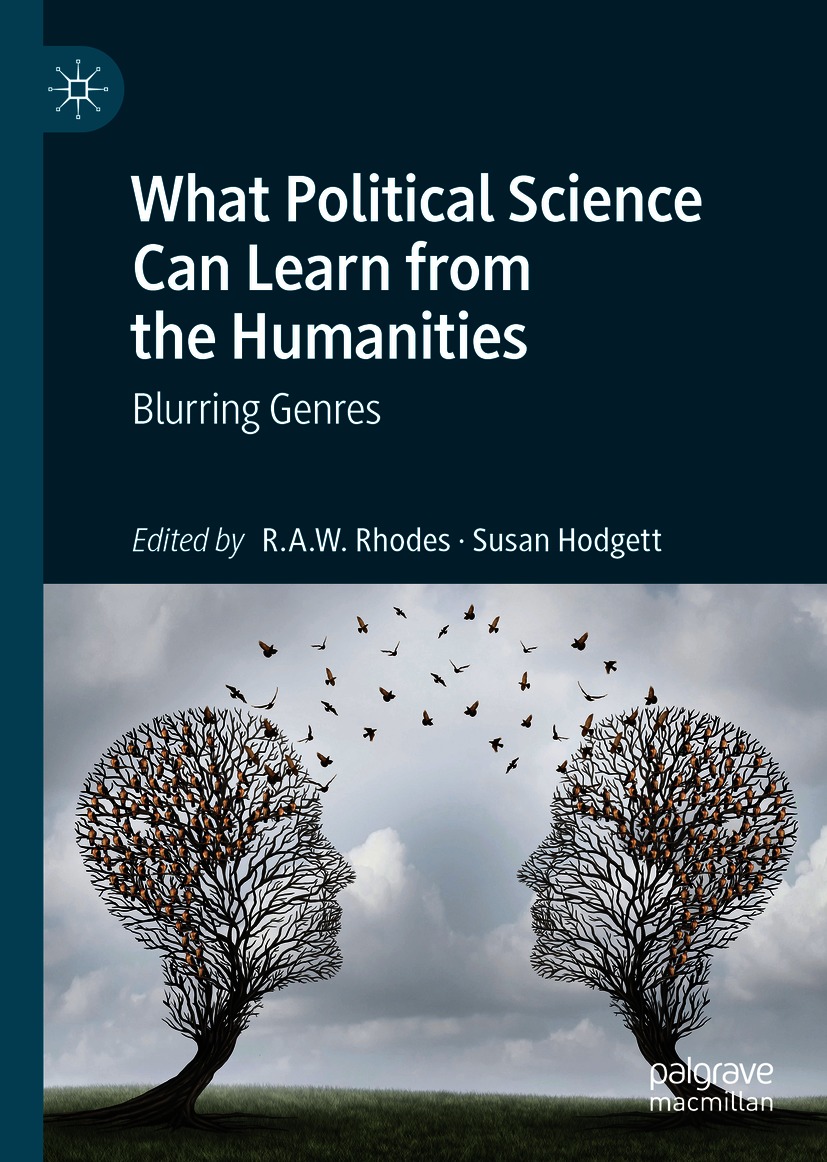Editors
R. A. W. Rhodes and Susan Hodgett
What Political Science Can Learn from the Humanities
Blurring Genres
1st ed. 2021

Logo of the publisher
Editors
R. A. W. Rhodes
University of Southampton, Southampton, UK
Susan Hodgett
University of East Anglia, Norwich, UK
ISBN 978-3-030-51696-3 e-ISBN 978-3-030-51697-0
https://doi.org/10.1007/978-3-030-51697-0
The Editor(s) (if applicable) and The Author(s), under exclusive license to Springer Nature Switzerland AG 2021
This work is subject to copyright. All rights are solely and exclusively licensed by the Publisher, whether the whole or part of the material is concerned, specifically the rights of translation, reprinting, reuse of illustrations, recitation, broadcasting, reproduction on microfilms or in any other physical way, and transmission or information storage and retrieval, electronic adaptation, computer software, or by similar or dissimilar methodology now known or hereafter developed.
The use of general descriptive names, registered names, trademarks, service marks, etc. in this publication does not imply, even in the absence of a specific statement, that such names are exempt from the relevant protective laws and regulations and therefore free for general use.
The publisher, the authors and the editors are safe to assume that the advice and information in this book are believed to be true and accurate at the date of publication. Neither the publisher nor the authors or the editors give a warranty, expressed or implied, with respect to the material contained herein or for any errors or omissions that may have been made. The publisher remains neutral with regard to jurisdictional claims in published maps and institutional affiliations.
Cover illustration: Brain light / Alamy Stock Photo
This Palgrave Macmillan imprint is published by the registered company Springer Nature Switzerland AG.
The registered company address is: Gewerbestrasse 11, 6330 Cham, Switzerland
Praise for What Political Science Can Learn from the Humanities
This book offers lots of surprises. Its chapters are deeply and rigorously grounded in several disciplines but the links across them are truly interdisciplinary. [It] offers an ambitious agenda of further scholarship in the burgeoning fields of narrative and linking humanities and social sciences. Some of these unconventional linkages (like autoethnography or architecture) challenge the reader. This insightful and thought provoking collection stimulates creative approaches to both political science and the humanities.
Mel Cappe, Professor at Munk School of Global Affairs and Public Policy, University of Toronto, Canada; and former Canadian Secretary to Cabinet and High Commissioner to the UK
This admirable collection has long been needed. Dominated by its two editorial contributions, it takes with complete seriousness the long-needed admonition to teach the social sciences how to use to their advantage and imaginative transformation the methods, materials, and convictions of the humanities. The result is exhilarating and transformative.
Fred Inglis, Emeritus Professor of Cultural Studies, University of Sheffield, UK
What Political Science Can Learn from the Humanities: Blurring Genres is an outstanding work of collaborative scholarship. The editors, Susan Hodgett and R. A. W. Rhodes, are prominent scholars who have assembled an all-star interdisciplinary team of contributors. This study applies analogies and metaphors from the humanities to political science and succeeds across the board. Blurring Genres sets an agenda for engagement of social sciences productively with the humanities that is based on disciplines ranging from architecture and design through comparative literature. The volume accesses a wide range of methods found in the humanities, such as autoethnography, along with content from fields like photography, to answer significant research questions while simultaneously identifying new and fascinating queries for further consideration. Blurring Genres is a volume that deserves attention throughout academia and even beyond because of its intellectual contributions and ability to inform our thinking about any number of social problems.
Patrick James, Dornsife Deans Professor of International Relations, University of Southern California
Preface and Acknowledgements
The aim of this book is to recover the methods of the Arts and Humanities for the use of political scientists and interdisciplinary area (or country) studies specialists. The origins of this book lie in a series of seminars under the title of Blurring Genres Network: Recovering the Humanities for Political Science and Area Studies funded by the Arts and Humanities Research Council (AHRC). Susan Hodgett took the lead in organising the network and the seminars, which investigated examples of blurring genres, or crossing boundaries, between the disciplines in pursuit of insight into making and remaking theory and practice. It brought together international scholars working on interpretive approaches to Political Science, with experts on Area Studies, to investigate what added value interdisciplinary research teams can bring to traditional research approaches when exploring modern governance.
The Blurring Genres Network sought to organise a research field that, to date, has been unstructured, lacking conferences, publications or directly relevant professional associations. The network explored the stories created, evolved and recounted in the implementation of everyday policy-making in the practice of modern government. It brought together learned societies (UK Council for Area Studies Associations, Political Studies Association UK and the Western Political Science Association USA). We organised seven workshops crossing the boundaries between the Arts and Humanities and the Social Sciences on the themes of political studies as drama, as narratives, as history, as anthropology, as literature, as the visual arts and as philosophy (and for more details, see https://app.researchfish.com/awards ).
The papers presented at the workshops are the origins of this book. R. A. W. Rhodes took the lead in editing the book. The selection of chapters was guided by the feedback we received on each seminar. Two themes stood out and the audiences returned to them time after timenarratives and the visual arts. It became clear quickly that the study of narratives and meta-narratives (narratives about narratives) was significant for historians, political scientists, sociologists, anthropologists, philosophers and policy-makers. The analysis of narratives is a long-standing staple of the Humanities and it became ubiquitous in the Social Sciences in the 2000s. So, this shared theme was neither novel nor a surprise. The sheer novelty of the visual arts in the study of politics probably explains why it commanded attention whether the example is photographs, cartoons or comics, and the workshops covered all three. We were also impressed by Mandy Sadans workshop paper on recovering the history of the Kachin people of Burma using photography and video (see also her

